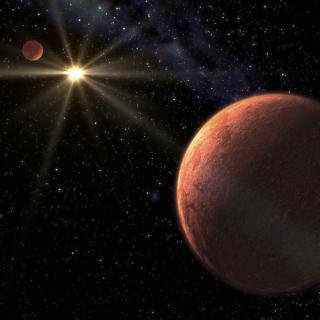Bibcode
Banerji, M.; Boudreault, S.; Emerson, J. P.; González-Solares, E.; McMahon, R. G.; Pinfield, D. J.; Lodieu, N.; Pérez-Garrido, A.; Zapatero Osorio, M. R.; Peña-Ramírez, K.; Rebolo, R.; Béjar, V. J. S.; Gauza, B.
Bibliographical reference
Monthly Notices of the Royal Astronomical Society, Volume 427, Issue 3, pp. 2457-2463.
Advertised on:
12
2012
Citations
11
Refereed citations
9
Description
We report on the discovery of a fourth component in the HD 221356 star
system, previously known to be formed by an F8V, a slightly metal poor
primary ([Fe/H] = -0.26), and a distant M8V+L3V pair. In our ongoing
common proper motion search based on Visible and Infrared Survey
Telescope for Astronomy (VISTA) Hemisphere Survey (VHS) and Two Micron
All Sky Survey (2MASS) catalogues, we have detected a faint J = 13.76
± 0.04 mag comoving companion of the F8 star located at angular
separation of 12.13 ± 0.18 arcsec (position angle of 221°.8
± 1°.7), corresponding to a projected distance of ˜317
au at 26 pc. Near-infrared spectroscopy of the new companion, covering
the 1.5-2.4 μm wavelength range with a resolving power of R ˜
600, indicates an L1 ± 1 spectral type. Using evolutionary models
the mass of the new companion is estimated at ˜0.08
M&sun;, which places the object close to the
stellar-substellar borderline. This multiple system provides an
interesting example of objects with masses slightly above and below the
hydrogen-burning mass limit. The low-mass companions of HD 221356 have
slightly bluer colours than field dwarfs with similar spectral type,
which is likely a consequence of the subsolar metallicity of the system.
Related projects

Very Low Mass Stars, Brown Dwarfs and Planets
Our goal is to study the processes that lead to the formation of low mass stars, brown dwarfs and planets and to characterize the physical properties of these objects in various evolutionary stages. Low mass stars and brown dwarfs are likely the most numerous type of objects in our Galaxy but due to their low intrinsic luminosity they are not so
Rafael
Rebolo López